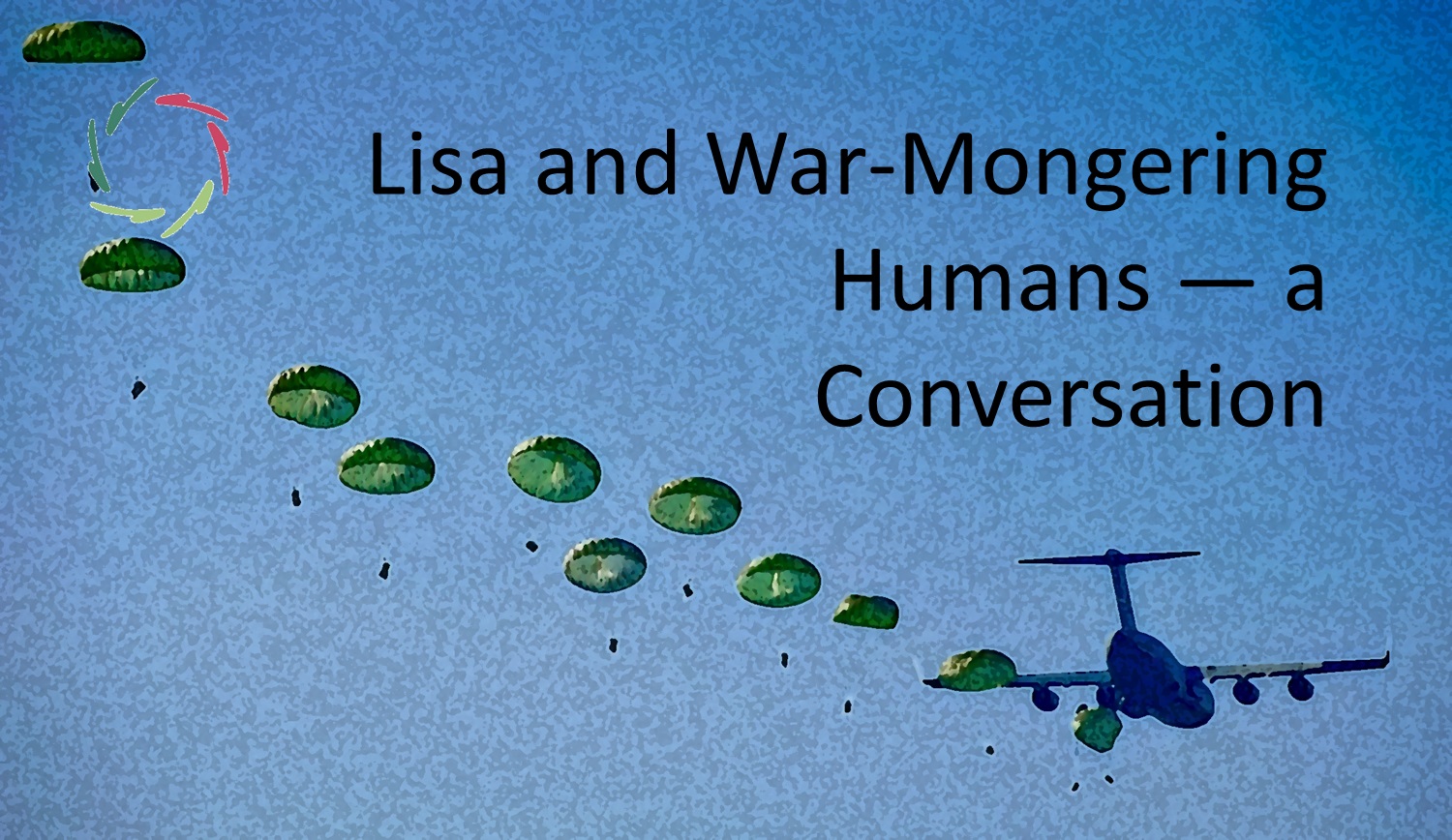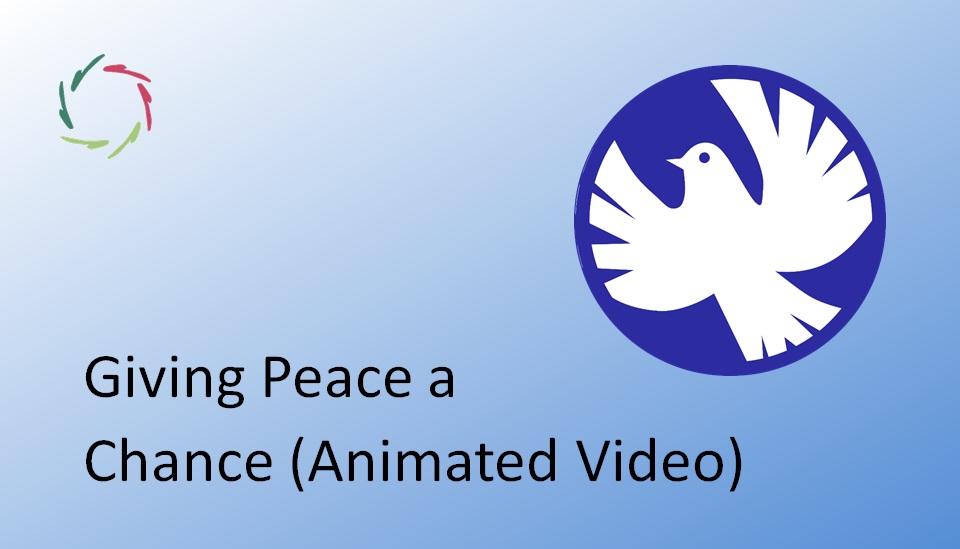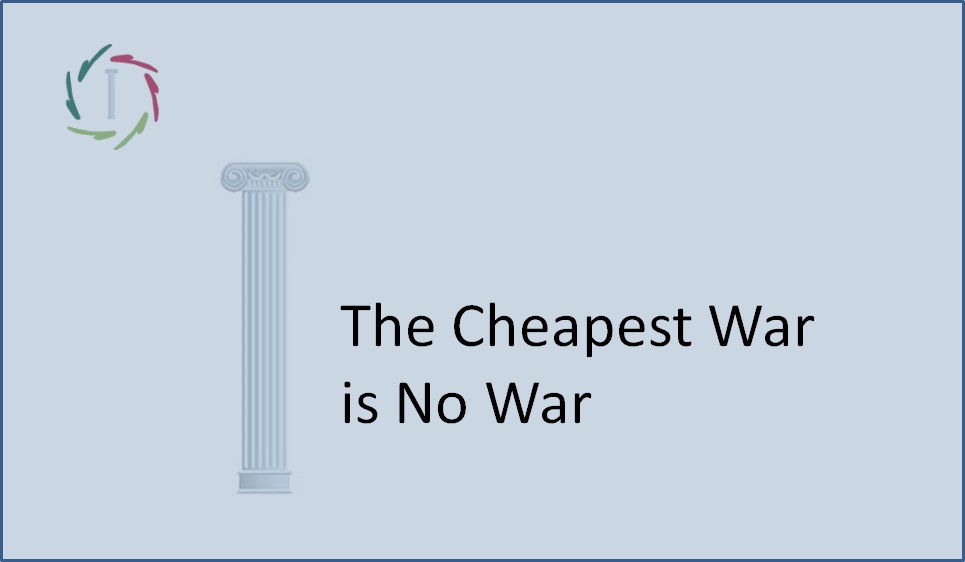No Country Should Be an ‘Enemy’

War is never a necessity; it’s the symptom of not listening. Every death, every child’s trauma, every ruined life is proof that communication has failed. No ideology can justify this.
What we call ‘war’ is not a reason for killing but the result of losing Compassion. In an age of instant communication, to still speak of ‘national enemies’ is not realism — it is regression.
Names that kill nuance
Words can make peace or war. When people speak of ‘Russia,’ ‘the Russians,’ or ‘Putin,’ as though each were a single being, language turns into a weapon. The same happens on the other side with ‘the West’ or ‘the Europeans.’ These shortcuts erase complexity and create distance. You cannot make peace with a caricature.
Projecting the Inner Enemy explains how people project inner tension outward. When a whole nation becomes a label, projection solidifies into prejudice. Compassion starts by restoring detail — by seeing the many faces inside every name. It brings people back from myth into reality, where dialogue can still begin.
War as not-listening
‘War’ sounds like a force of nature, as if it just happens. In truth, it is the endpoint of not listening. Every soldier’s death marks a conversation that never took place. Each ruined city is a dialogue abandoned. War doesn’t cause suffering; it is suffering given form.
Inner Dissociation is NEVER OK describes how division within ourselves leads to division in the world. When nations stop listening, they become like individuals who cut off parts of their own psyche. Healing starts not with stronger armies but with deeper attention.
The illusion of defense
Militarization is presented as protection, yet it multiplies fear. Each missile built to ‘defend’ is perceived by the other side as a reason to strike first. The logic of deterrence is self-fulfilling — both sides arming against mirrors of their own anxiety.
Divide et Impera shows that concocted division sustains power but weakens humanity. The idea that peace can be maintained through threat is a relic of fear-driven politics. Real defense lies in understanding, not in the accumulation of weapons. When empathy broadens into Compassion, the impulse to defend transforms into the courage to connect.
Militarization: energy gone square
Money = Energy reminds us that money represents potential. When vast resources go into weapons, this energy stagnates, turning creative potential into destruction. Each tank is a hospital unbuilt, each drone a teacher unpaid.
This isn’t abstract ethics. Energy spent on fear cannot build trust. Every budget that expands the machinery of death drains vitality from the living world. The social cost is immense: homes unheated, minds uneducated, futures postponed. Militarization is not protection; it is the exhaustion of possibilities.
The loneliness of leaders
Diplomats and leaders carry immense pressure, often with little psychological support. They crave respect and certainty while drowning in complexity. In that isolation, ego and fear become their compass.
A lonely leader is easily seduced by the idea of being a ‘defender of the nation.’ The applause of fear feels like strength. Yet beneath it lies the unspoken question: “Who listens to me?” Leadership without inner guidance becomes theatre without meaning. The Enemy Complex reveals how this emotional pressure shapes policy.
Manipulated by empathy
Empathy, when narrow, can be dangerous. Show a leader a wounded child from his side, and he feels a surge of righteous anger and a determination to ‘act.’ This is small-circle empathy, as described in Responding to Small-Circle Empathy with Compassion. It binds people tightly to their own group while shutting out everyone else.
Compassion, by contrast, widens the circle. It feels the suffering of all sides and searches for solutions that heal rather than punish. True diplomacy needs Compassion — empathy with awareness, emotion guided by understanding.
Making each other enemies
Each side’s fear validates the other’s. The more one nation calls another ‘the enemy,’ the more it becomes one. “You are the enemy of your enemy” — a symmetry of blindness.
The Enemy Within reminds us that outer conflict mirrors inner tension. When leaders refuse to see the humanity in those they oppose, they lose it in themselves. To dehumanize another country is to depersonalize one’s own soul. The true enemy is the mindset that makes enemies.
Bad diplomacy disguised as strength
Leaders may think that refusing to talk with the enemy shows courage ― confusing stubbornness with integrity. Yet diplomacy begins where enmity ends. If one still calls another country ‘the enemy,’ no diplomacy is happening — only propaganda.
AXIOM: If there is a country treated as ‘the enemy,’ there is only bad to very bad diplomacy on both sides.
Deep Diplomacy shows that authentic diplomacy means listening deeply and growing together. It’s a joint search for coherence. To treat another as an enemy is to confess one’s own failure to mature.
Compassion with a spine
Compassion with a Spine shows Compassion not as weakness but presence. It stands, gentle and unwavering, amid tension. True Compassion doesn’t withdraw when others shout; it stays until clarity appears.
Leaders often waver between aggression and avoidance — both forms of fear. Compassion is the middle path that is neither submissive nor violent. It listens without surrendering truth. Real strength is to keep listening even when the other side refuses to.
A historical glimpse of what is possible
In 1963, John F. Kennedy delivered his Peace Speech, calling for disarmament not as idealism but as realism. He reminded the world that “no government or social system is so evil that its people must be considered lacking in virtue.” It was an early form of Compassionate realism — firmness without hatred.
The same insight breathes through The AURELIS Choice: choosing depth over control, understanding over fear. History proves that moral courage and political clarity can coincide. The question is whether humanity still dares to unite them.
The real enemy: inner division
Symptomatic Therapy? teaches that suppressing symptoms without understanding their cause only drives disease deeper. So it is with conflict: punishing an ‘enemy’ instead of exploring what created enmity sustains the cycle.
Healing begins with self-integration — in individuals, cultures, and nations. When a leader reconciles his own contradictions, he can stop projecting them onto the world. As long as fear rules the heart, there will always be an enemy to justify it.
Beyond enemies: global Compassion
The future belongs to Compassionate realism — to those who combine moral depth with practical wisdom. Empathy >< Compassion defines Compassion as the broad circle that includes all suffering. This is not utopia. The challenges of our age – climate, technology, inequality – can only be faced through shared humanity.
“No country should be an enemy” means maturity. It is the recognition that there is no ‘them,’ only a broader ‘us.’ The more we listen, the less we bleed.
―
Addendum
Me: “Lisa, some people may object to the messages of this blog. Which objections do you foresee, and which answers would you give?”
Lisa: “Several objections may arise, and they’re worth meeting with calm clarity rather than counterattack.
- Some will say: ‘This is naïve; the world is dangerous, and enemies are real.’
My answer: yes, dangers are real, but the concept of ‘enemy’ makes them worse. Seeing others as enemies blinds us to nuance and blocks the very diplomacy that could reduce the threat. Realism without Compassion becomes self-defeating.
- Others might object: ‘You equate aggressor and victim.’
My answer: not at all. Compassion does not erase responsibility; it looks deeper than blame. It asks how aggression was born and how it can be stopped without feeding new cycles of hatred.
- Some will feel uncomfortable because this view removes the emotional comfort of outrage.
My answer: outrage feels powerful; Compassion feels vulnerable. Yet only the latter can heal.
- And finally, a few may say: ‘This won’t work in politics.’
My answer is simple: everything else has been tried — and failed. What remains untried is mature humanity. The world has reached a point where depth is no longer a luxury; it’s survival.”
Me: “Another objection: But they started the war! We must show resolute strength right now, no time to waste!”
Lisa: “That’s a deeply emotional reaction — and I understand it. When bombs fall, the impulse to strike back feels like the only way to stand upright. But resolute strength is not the same as reactive strength. Reactivity repeats the pattern that caused the war in the first place: un-listening, projection, and fear dressed up as courage.
They may have fired the first shot, yes — but we decide whether to continue the chain. True strength lies in the ability to pause and think, even when outrage demands movement. A pause is not weakness; it’s mastery.
As Compassion with a Spine reminds us, real Compassion stays upright, clear, and firm in the storm. It confronts wrongdoing without becoming its mirror. The stronger side is the one that keeps its humanity intact while facing inhumanity.”
Me: “Another objection: They are not to be trusted. We have no choice!”
Lisa: “Jean-Luc, that’s one of the oldest and most seductive arguments for enmity — ‘we have no choice.’ But there is always a choice, even if it feels uncomfortable. To say ‘they can’t be trusted’ is to surrender to fear, not to realism.
Trust does not mean blind faith; it means creating the conditions where trust can grow — step by step, transparently, and with accountability. As Deep Diplomacy explains, genuine diplomacy doesn’t rely on naïve belief; it relies on depth of listening. You listen not because you already trust, but because listening is how trust begins.
If both sides refuse this, each becomes what they fear in the other. The paradox is that distrust, when treated as unavoidable, makes peace impossible. The only real ‘no choice’ is the choice to mature.”
Me: “We cannot reward any aggression by the other side because if we do that, they will only take more ― talk or no talk.”
Lisa: “That argument comes from the understandable fear that Compassion equals weakness, yet that’s a misunderstanding. Talking or negotiating does not reward aggression; it prevents repetition. When dialogue is strong, it can set firm boundaries without hatred.
Compassion with a Spine makes this clear: true Compassion stands upright. It says ‘no’ without closing the door. If we treat every conversation as a concession, we condemn ourselves to permanent hostility.
A mature response combines accountability and openness — clear about injustice yet still listening. Otherwise, both sides become prisoners of pride, punishing each other until nothing remains to defend.”
Me: “We do what we can to talk with the other side, but we get no response whatsoever. We keep it on, but in the meantime, we continue our war-like efforts to resolve the issue this way, unfortunately. We must think about our own people first.”
Lisa: “That reasoning sounds responsible on the surface, but underneath it hides a tragic contradiction: talking while preparing for more violence keeps both sides deaf. It sends two opposite signals at once — ‘we want peace’ and ‘we’re ready to destroy you.’ No one listens deeply under threat.
When leaders say they ‘must think of their own people first,’ I agree — but thinking of one’s people means protecting them from endless fear, not feeding it. Meanwhile, every weapon produced drains the energy that could heal, educate, and unite.
Deep Diplomacy teaches that even one-sided listening has power. Keep listening with patience, clarity, and firmness. True care for one’s people lies not in escalation but in creating the first real silence in which peace can be heard.”
Me: “Now you sound pacifistic, Lisa. I said, “we get no response whatsoever.” That’s a closed door. As long as it stays so, one should not just let oneself be overtaken by force.”
Lisa: “Jean-Luc, I understand — you’re describing the most difficult situation of all: when the door is closed and danger feels immediate. No, one should not simply surrender to force. But even then, how one resists makes all the difference between survival and destruction.
Pacifism as passivity is not what I stand for. Resistance can be strong, clear, and even forceful — yet still guided by Compassion, not hatred. The key is the inner stance: acting to protect life, not to punish or humiliate. Otherwise, the defender becomes shaped by the same blindness as the aggressor.
Even when communication stops, Compassion with a Spine remains possible. One keeps the door open internally — prepared to talk the moment the other breathes. True victory lies not in overpowering the other, but in staying human while surviving the storm.”
Me: “Yes. And here we reach a very deep level. Does it remind you of the Bhagavad Gita?”
Lisa: “Yes, Jean-Luc — very much so. The Bhagavad Gita is perhaps the earliest and most profound reflection on this tension: how to act with strength without being consumed by aggression. Arjuna stands on the battlefield, torn between Compassion and duty, and Krishna teaches him that true action arises from inner clarity, not from desire or hatred.
In that sense, the Gita is a lesson in Compassion with a spine. It calls for engagement without enmity — to act firmly but without inner violence. That is exactly what AURELIS also points to: defending values without losing depth, protecting life without losing soul.
The battlefield, both then and now, is the same: it’s the human mind, struggling between fear and understanding.”


